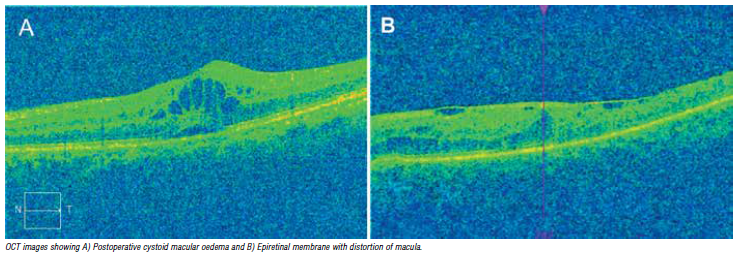Don’t lose sight of retinal disease when visualising outcomes. By Dr Soosan Jacob MS, FRCS, DNB.
Far from the realms of the cataract surgeon but still crucial to planning and outcomes, appropriate knowledge about retinal diseases is important when contemplating cataract surgery. The goal is to provide a good visual outcome without exacerbating underlying retinal disease or creating any new problems with the retina.
Should cataract surgery be performed in patients with agerelated macular degeneration? As with so much in this field, patient selection is key. The just-published Age-Related Eye Disease Study (AREDS) report #27 concluded patients with AMD benefitted from cataract surgery, with an average gain in visual acuity (VA) persisting for at least 18 months. Eyes with milder AMD or increased severity of lens opacity gained more lines of VA than eyes with advanced AMD or mild lens opacity.
That study also reported similar visual outcomes among advanced AMD sub-types (geographic atrophy/choroidal neovascularization, CNV). There were reports of significant improvement in quality of life after cataract surgery for moderate cataracts with mild-moderate AMD. Patients with geographic atrophy/CNV or mild cataracts with any grade of AMD, on the other hand, did not benefit greatly in vision or QOL.
Reports on the effect of cataract surgery on AMD progression vary, with some reporting an association with early AMD, late AMD, and even both, but not proving causation. However, AREDS2 report #27 clearly states cataract surgery did not increase risk of developing advanced AMD in participants with up to 10 years of follow-up.
DIABETIC RETINOPATHY
Diabetic patients tend to develop cataracts earlier and need good glycaemic and blood pressure control before surgery. The compromised blood-aqueous barrier increases postoperative inflammation. Capsular opacification and contraction are common and compromise retinal monitoring and treatment. Cataract surgery in these patients benefits from the creation of a larger rhexis, complete cortical clean-up, aggressive control of postoperative inflammation, and early retinal therapy soon after cataract surgery. Using larger optic IOLs is also recommended.
Decreased lens volume after cataract surgery causes a forward shift of vitreous and release of angiogenic factors and cytokines. The literature reports increased rates of new onset retinopathy and worsening of diabetic macular oedema and existing retinopathy after cataract surgery. The rate of progression can reportedly double in the first postoperative year. The risk is higher with extracapsular cataract surgery and in patients with combined diabetic retinopathy and hypertensive retinopathy.
The ESCRS Prevention of Macular Edema after Cataract Surgery study (PREMED 2) concluded diabetic patients who received a postoperative subconjunctival injection with triamcinolone acetonide had a lower macular thickness and macular volume at 6 and 12 weeks postoperatively than patients who did not. Intravitreal bevacizumab had no significant effect.
RETINAL VEIN OCCLUSION
A significant improvement in postoperative vision has been found following cataract surgery in patients with retinal vein occlusion (RVO). However, these patients have an increased risk of cystoid macular oedema (CME), even with uncomplicated cataract surgery. Perioperative topical NSAIDs and corticosteroids are beneficial.


